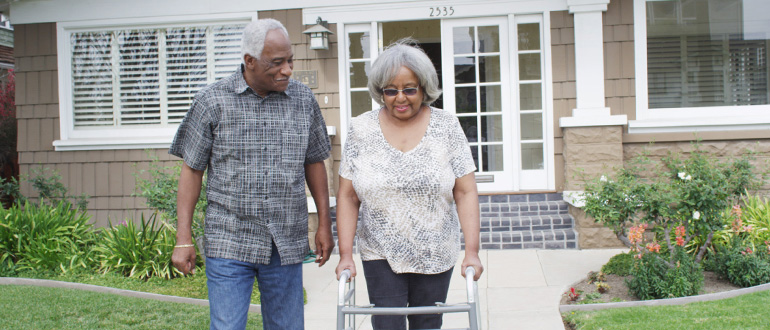The link between housing and mental health


“She went from homeless to a stable situation.” Denise Harris, Director, Care Coordination Services at Health Care Access Now (HCAN) and Licensed Professional Counselor, tells the story of a client whose whole life improved because of a housing change.
With the assistance of her HCAN Community Health Worker (CHW), this woman moved into a community specifically created to support individuals with mental health issues. “The building is secure, the grounds are maintained, the halls are kept clean, and there are cameras to monitor activity inside and out. She felt safe once she got into her apartment, and it helped stabilize her mental health,” Harris says.
Having not just affordable—but also suitable—housing can make a significant difference in the mental health and wellbeing of anyone. But those who are suffering from mental health concerns such as depression, anxiety, or Post-Traumatic Stress Syndrome (PTSD) can find that unsuitable housing exaggerates their issues.
[Rents keep climbing, affecting health negatively]
Environment matters
Harris says that the environment in which people live can truly affect their mental and emotional wellbeing. She talks about a housing project located near a landfill where she used to visit clients. “The unhealthiness of that environment meant that there wasn’t a lot of wildlife or greenery—just cement. If you live in a situation where there’s nothing you can take pleasure in looking at, that can sometimes trigger a mental health condition, such as depression.”
Many low-income housing developments are built in places where no one wants to live. “If you’re right next door to a factory, the air quality is so hindered it can affect not only your physical but also your mental health,” she says. “I’ve worked with children and families who suffered from chronic asthmatic illnesses, all due to the location of their housing.”
And, people who live in areas of concentrated poverty may also be exposed to more criminal activity, which heightens trauma, anxiety, and other mental illness. “The sound of sirens, fights, unexpected noises”—all of those could act as triggers for PTSD, says Harris. “Some individuals are no longer able to enjoy community fireworks due to the similarity of sounds related to gun shots.”
Air conditioners and central air units are also very important for people suffering from mental illness, she says. Certain medications can cause the body to regulate heat less effectively, and “heat can act as an easy trigger for mental health challenges.”
[Not enough suitable housing in Cincinnati]
Stress overload
Financial issues can ramp up stress. At first, this can create issues like increased anxiety and trouble sleeping, but eventually “stress…can negatively affect [physical] health and even contribute to chronic health problems such as diabetes and heart disease,” according to research from the American Psychological Association.
HCAN’s CHWs advise clients to spend no more than 30% of their total income on housing. While that’s seemingly a simple equation, there can be many factors that contribute to its impossibility. Harris says, for example, that a lot of landlords avoid renting to tenants with children, which further reduces the potential housing pool.
And, while many HCAN clients are eligible for government assistance and housing vouchers, there is a long waiting list, and the extra regulations can make finding suitable housing even more difficult. For example, “Someone may have a son and a daughter, and if they’re on Section 8, [the children] can’t share the same room,” Harris says. That means potentially having to rent a larger (and more expensive) space.
Many people wind up paying more than 30% of their income for housing and thus have less money to allocate toward other essentials, such as healthy food, transportation, or prescriptions. It also puts them at risk for eviction.
“Not knowing if you’re going to be able to come up with the money for rent every single month, not knowing if repairs will be made if something goes wrong”—that kind of instability negatively affects people’s mental health. It can also mean that single mothers, for example, might be forced to work overtime or multiple jobs to afford housing, leaving less time and energy for their children.
[Logan Towers provides quality housing]
Inextricably linked
Harris says CHWs do their best to set clients on the path toward better housing—but it isn’t always possible to completely change clients’ situations. And CHWs are in a difficult position when it comes to identifying and alleviating clients’ mental health issues.
“People might not identify their depression because they don’t know anything other than that,” for example, Harris says. “They feel it’s just a normal emotion.” But, she says, “We are very fortunate to have community connections with mental health agencies, allowing us to assist our clients with referrals when needed.
Harris also says, “Having a CHW assigned to a client helps them understand how they can maintain stability by reassessing their goals for housing.” Some things to take into consideration include how much they can really afford to pay for rent, assessing the environment before the move happens, and researching community schools for their children along with the possibility of working close to home.
Mental health and suitable housing are inextricably linked. Suitable housing can help alleviate its symptoms, while unsuitable housing can exacerbate them.






